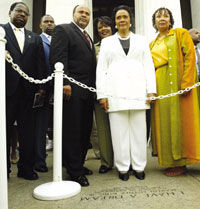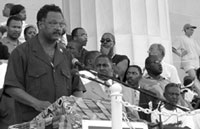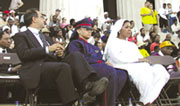
WASHINGTON (FinalCall.com)-The 40th anniversary of the March on Washington was a commemoration, August 23, of the 1963 gathering of Blacks for jobs, peace and freedom. It was also the launching pad for a massive mobilization to create the largest voter turnout in history.
“My father was more than a dreamer,” said Martin Luther King III to the cheering crowd. “Martin Luther King Jr. was first and foremost a minister of action. We come to Washington in August 2003 to demand the same things our parents demanded in 1963: jobs, peace and justice.”
He explained that he is calling for a 15-month voter registration and education drive.
“The issues confronting us are so serious that we just can’t have a one-day celebration. We have to have a 15-month mobilization that ends November 2, Election Day,” said Rev. Walter Fauntroy, a march organizer and former director of the Washington branch of the Southern Christian Leadership Conference (SCLC).
“We must demand a change in public policy,” said Rev. Fauntroy, “The country needs a massive voter registration and education plan. We want to give Dr. King a birthday present January 15 by registering to vote.”
More than 30 groups and organizations rallied together in D.C.’s summer heat to speak to the thousands who came from across the country about the issues of the day. Placards abounded with “Palestinians have Rights Too,” “No War on Cuba Movement” and the “NAACP Supports Affirmative Action.”
The speaker platform included three presidential hopefuls, former Vermont governor Howard Dean who also shook hands in the crowd, Carol Moseley-Braun and Rev. Al Sharpton who was repeatedly referred to as “Mr. President.”
“We must join Martin in the struggle,” said Rev. Sharpton, head of the National Action Network. “It’s not about age, but the agenda.”
“Bush wants to push the right to vote in Iraq, but not the right to vote in D.C.,” said Rev. Sharpton. He was referring to the city’s lack of voting rights in the Congress. Many began to shout “No taxation with representation!”
Students who were not even a dream when Dr. King brought 250,000 to the Lincoln Memorial and the Reflecting pool in 1963 were a significant part of the spirited crowd that numbered between 4,000 and 5,000.
“I wasn’t even born when it happened in 1963, but I wanted to be a part of this history, a part of the change,” said LaTosha Bruce, a Ph.D student at Howard University’s Graduate School of Culture and Communications.
“We’ve come a long way and we have a long way to go. I want to know what my next step should be. I’m here looking for guidance and direction.”
The need to merge young with old was addressed by the Honorable Minister Louis Farrakhan in his remarks that were delivered by his spokesperson, Sis. Min. Ava Muhammad.
“Young people are being separated from the wisdom of their elders,” she explained.
In a time when many people are reluctant to listen to those who came before them, Min. Farrakhan encouraged the youth, “Don’t dismiss wisdom and age. Be humble and learn.”
Mobilizing for change
The commemoration for the 40th anniversary began with a series of tented teach-ins. They were developed to educate the march attendees on a variety of issues that the speakers would be addressing later.
They included the National Urban League’s presentations on criminal and economic justice and the American Federation of Teachers and National Education Association teach-in on education issues.
Ron Daniels, a longtime community organizer and activist told The Final Call, “Well, I always believe you take these moments and use them as a point to galvanize a movement to move forward.
“In that sense, this is the kick-off. The way it’s been conceptualized, as a kick-off for a 15-month rolling mobilization. It couldn’t be at a more crucial hour in history in relation to the interests of African people and others who were a part of the ‘Beloved Community’ that convened here in 1963.”
He went on to say, “If the forces of reaction continue to prevail, then they will set the clock back. It will be like Plessy v. Ferguson, the post-Reconstruction period all over again. So this is very crucial activity, and it is important that it began with a teach-in to signal the seriousness and sobriety of it. Then, we will be moving on to Cincinnati and other places over the next 15 months.”
Many at the march were concerned that this commemoration didn’t compare to the 1963 March, the 20-year anniversary and the 30-year anniversary.
“All too often, when we do commemorations, we try and replicate the original event. We can’t do that with the March on Washington. So, I think every succeeding commemoration, we had fewer and fewer people, and that was troublesome,” Sonia Jarvis, of the Black Women’s Agenda and former Director “Operation Big Vote” told The Final Call.
“What’s different about this is that it comes at a unique historical moment. People want to talk about it, combined with an emphasis on public policy, which was also part of the original march, but no one ever talks about that. They talk about ‘The Dream.’ They talk about the speech, but they don’t talk about the demands that were made by the people.”
She continued, “This approach, in terms of teach-in, builds on that original foundation. That’s one of the reasons I wanted to support it and come out today and spend some time talking about economic justice and jobs.”
Speaking in support

The day’s speakers included representatives of various movements and organizations. Notables included Rev. Jesse Jackson of the Rainbow/PUSH Coalition, Damu Smith of Black Voices for Peace, D.C. Representative Congresswoman Eleanor Holmes Norton and community activist Mark Thompson.
Coretta Scott King, widow of Dr. King, spoke to the audience about parts of her husband’s speech in 1963 that are rarely discussed.
“We must bring the same cry for justice to the issue of world peace,” she said. “Martin said ‘No justice without peace and no peace without justice.’ Non-violence must become the foundation of American foreign policy.”
“We must make our hearts instruments of peace,” she said.

Min. Farrakhan through Min. Ava told the crowd the significance of the 40th anniversary. “The number four is representative of foundation and preparation for something greater and better to come. Something new and better is about to unfold.”
“Moses was 40 when he received revelation and Muhammad (peace be upon him) was 40 when he received revelation. The number 40 is significant. We are headed toward a new world order based on freedom. justice and equality.”
Congressman John Lewis (D-Ga.) was the youngest speaker of the day in 1963, as chair of the Student Non-violent Coordinating Committee (SNCC). He was also one of the “Big Six” organizers of the 1963 march.
That group included Dr. King, Whitney Young of the National Urban League, Roy Wilkins of the National Association for the Advancement of Colored People (NAACP), James Farmer of the Congress of Racial Equality (CORE) and A. Phillip Randolph who organized the Brotherhood of Sleeping Car Porters.
“We live in a different world. 40 years ago in the South, segregation was alive and well,” said the Georgia congressman. “We had to do something to dramatize the sense of urgency of the time. The March on Washington didn’t just happen. We didn’t decide to jump up one day (and have a march). We organized, planned and did hard, nitty-gritty work. We traveled. We had meetings at churches and schools.”
“We didn’t have fax machines, cell phones, web sites and computers. We stood and put our bodies on the line. We got in the way. Too many of us got too complacent. We need to agitate. In spite of our progress, there’s still a way to go,” he said.












